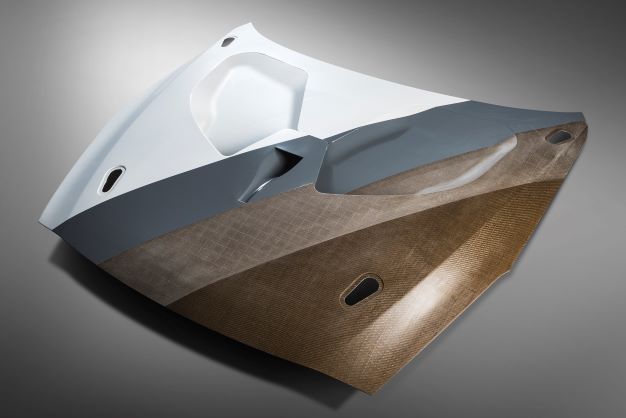
Could you tell us a little about Retrac?
Retrac is one of the UK’s leading advanced manufacturing specialists. Based in Swindon, we focus on composites and precision metallics for both tooling and component manufacture. It is not just automotive; we serve sectors such as aerospace, defence and marine. It all started with F1 and in 2021 we still serve that sector, supplying half the grid with either CNC machined metallics or composite parts. We work with each team in a different way but essentially, we are a key collaborator, bringing ideas, capacity, technical support and trust.

Discover B2B Marketing That Performs
Combine business intelligence and editorial excellence to reach engaged professionals across 36 leading media platforms.
We understand you have recently joined Retrac. What attracted you?
Andy Carter, son of the founder of Retrac, had led the business for two decades and was looking for a succession plan. Retrac has a fantastic reputation, so we engaged and I joined as CEO, with Andy as chairman, as part of the business ownership being transferred into an Employee Ownership Trust. This makes each of the employees – currently at 115 – at Retrac is now the beneficiary of surplus profits. We did this because we wanted a greater sense of engagement and share in the benefits of the work they put in. We’ve already seen it working; from increased productivity but also a deeper reflection on the decisions that they make. It’s been very effective and well-received also by our customer base.
You have recently announced a new range of biocomposites. Can you tell us more about that?
Yes. We call this new range ‘Retrac Future’ and it includes biocomposites, bio-content resins and energy-efficient manufacturing methods. There are five sustainable, recycled or recyclable composite material options that begin to meet the increasing demand for enhanced sustainability. I feel we are on the cusp of a lightweighting revolution but there remain questions around some of these materials and how they are made. Sustainability is fast becoming a vital factor in response to government legislation and increasing global pressure and is not just about the materials but also the entire life cycle. We have also signed up to the UK Government’s SME Climate Commitment to halve greenhouse gas emissions by 2030 and achieve Net Zero emissions by 2040.
What sort of materials will you offer?
‘Retrac Future’ puts Retrac at the forefront of knowledge and techniques to maximise successful applications of natural fibres and recycled composites and at the cutting edge of reducing the carbon footprint of high-end composite solutions. We now have a range to demonstrate to customers what is possible using sustainable and recycled materials. Examples include a partnership with leading flax natural fibre specialist Bcomp, and Composites Evolution, the UK-based prepreg manufacturer and supplier. The latter combines its high-performance Evopreg epoxy resin systems with Bcomp’s award-winning ampliTex range of flax reinforcements.
Alongside this, we have a recycled carbon fibre option and another that uses flax with a resin system that features a market-leading level of sustainably sourced ingredients.
We have also developed two thermoplastic materials from woven carbon and woven glass respectively which can both be manufactured in the compression moulding press system and have an existing end-of-life recycling strategy.
Compression moulding is used instead of an autoclave to produce the composites?
Yes, traditionally, to manufacture carbon fibre or thermosetting composites they need to be cured by the application of vacuum, heat and pressure in an autoclave. This is a long process that tends to need long periods of high energy consumption. That’s why we have focused on developing compression moulding over the past 18 months to offer a solution that is more efficient but also faster, opening up the possibility for lower volume manufacturers to adopt composites at the right price point for mass production.
Compression moulding is fairly new but is not unique to Retrac. What is special about what you are doing?
Yes, compression moulding has been around for decades and is already used by OEMs and Tier Ones. What is different at Retrac is how we apply the pressure. We are different, using an electro servo and our proprietary software to apply the pressure on our 60-tonne machine in a very specific way. The vast majority of presses are hydraulic, not servo-assisted, so they cannot deploy the fine control over the last few mm which we can. The servo-driven design allows precise control of platen position and load at every part of the pressing cycle. This is critical for repeatable, high-quality manufacturing of composite parts. It makes a big difference to quality but also enables us to achieve OEM standard parts even using recycled or more sustainable materials. That is a key difference and crucially, it’s much faster too.
Can you quantify that?
One example our engineers have highlighted is an example of a body panel we are working on for a niche vehicle OEM. We can produce the desired part in around four minutes. A clave cycle for a similar part is likely to be 360-720 minutes. Even factoring in a clave’s ability to do multiple parts at once, initial tests suggest it could be possible to make parts in 10 per cent of the time, or even less, with considerably less energy. Because of its speed and repeatability, in automotive OEM terms, mid-volume production – running into tens of thousands of parts per year – becomes achievable.
Will you be announcing any OEM projects?
I can confirm we have engaged with multiple OEMs, particularly in hypercar and commercial EVs, but the nature of our work is that we cannot publicise individual clients. But we are delighted with engagement and take-up so far, and it is growing stronger month by month.






